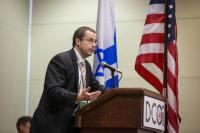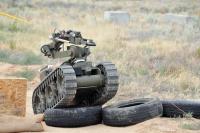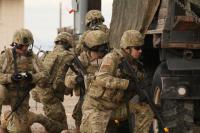-
Six things Americans should know about mass shootings

The United States had 78 mass shootings during that 30-year period. The highest number of mass shootings experienced outside the United States was in Germany – where seven shootings occurred. In the other twenty-four industrialized countries taken together, 41 mass shootings took place. In other words, the United States had nearly double the number of mass shootings than all other twenty-four industrialized countries combined in the same 30-year period.
-
-
Hazardous-devices teams compete at the Robot Rodeo, 14-17 June

Hazardous-devices teams from around the Southwest will wrangle their bomb-squad robots at the tenth annual Robot Rodeo beginning Tuesday, 14 June, at Los Alamos National Laboratory. “The Robot Rodeo gives bomb-squad teams the opportunity to practice and hone their skills in a lively but low-risk setting,” said a member of the Laboratory’s hazardous-devices team.
-
-
Move over sniffer dogs: Witnesses can identify criminals by smell
Move over sniffer dogs, people who witnessed a crime are able to identify criminals by their smell. Police lineups normally rely on sight, but nose-witnesses can be just as reliable as eye-witnesses, new research has found. The research shows that humans have the ability to distinguish individuals by their unique body odor.
-
-
DHS announces $40 million funding opportunity for new Criminal Investigations Center of Excellence
DHS S&T earlier this week announced a $40 million funding opportunity for an institution to lead a new DHS Center of Excellence (COE) for Criminal Investigations and Network Analysis. This new COE will conduct end user-focused research to enhance investigation strategies of transnational criminal organizations’ (TCO) activities and other homeland security-related crimes.
-
-
Using lasers to solve hit-and-run whodunit
Scientific sleuths are investigating how a laser-based tool called pump-probe microscopy can be used to differentiate between individual pigments of paint, even if they appear identical to the human eye. The researchers are developing the technique as a way for art historians and conservators peer under the surface of priceless paintings, without causing damage to the artwork, but there is no reason the technique cannot be used for forensics, too.
-
-
France unveils app to alert people to terror attacks
Euro 2016 soccer tournament begins on Friday, and as part of the massive security operation undertaken to secure the ten millions spectators who will be watching the games from 10 June to 10 July, the French government has created a smartphone app designed to send warnings directly to people’s phones in the event of a bombing, shooting, or other disaster.
-
-
Offender risk assessment tools in U.S. are promising, but questions remain
The criminal justice system in the United States uses a variety of tools to assess the behavior of criminal offenders, and those risk assessments can have a significant impact on an offender’s fate. A new meta-analysis of the research conducted in the United States on these tools shows that – while promising – it is still unclear whether these tools reduce bias against offenders based on race or other factors.
-
-
Last surviving 9/11 search-and-rescue dog dies, receives hero's send-off
The last surviving search and rescue dog who worked at Ground Zero following the 9/11 terrorist attacks died on Monday. Bretagne, a 16-year-old golden retriever, was put down at Fairfield Animal Hospital in Cypress, Texas. As Bretagne slowly walked into the hospital, she was saluted by representatives of state agencies who came to pay their respects.
-
-
Global small arms trade reached $6 billion in 2013
The Small Arms Survey’s Trade Update 2016: Transfers and Transparency reports that the world’s “top” and “major” small arms exporters delivered at least $5.8 billion worth of small arms in 2013, an increase of 17 percent compared to the $5 billion worth exported in 2012. The United States exported a record $1.1 billion worth of small arms in 2013. Transfers of small arms to the United States ($2.5 billion) alone accounted for 42 percent of all imports.
-
-
Revisiting the relationship between hate crime and terrorism
New research from START examines the link between hate crime (bias-motivated crime) and terrorism at the county level, focusing on far-right extremism in the United States and pulling data from the U.S. Extremist Crime Database (ECDB) and the Global Terrorism Database (GTD). Among other things, the research has found that counties experiencing increases in one type of bias-motivated or extremist violence are likely to see significant increases in other types of extremist activity.
-
-
Terrorist or criminal? New software uses face analysis to find out

Pulling a poker face means betraying no visible emotion, so that opponents cannot tell what you are really thinking. But a Tel Aviv startup’s face-profiling technology recently proved fairly accurate at predicting which four players were most likely to beat out forty-six other contenders in an amateur poker tournament. The company say that its technology, which analyzes faces shown in photos and videos and classifies them according to fifteen parameters predictive of personality traits and types, can help identify terrorists.
-
-
Quantifying the weight of forensic evidence
The weight-of-evidence question comes up anytime a forensic examiner assesses the likelihood that a piece of evidence left at a crime scene originated from a particular source. NIST hosted a technical colloquium on this important question, which virtually every branch of forensic science today faces. The colloquium addressed this specific question: How should forensic examiners quantify the weight of evidence they find in a case? This was the first technical colloquium in the United States to focus specifically on this issue.
-
-
Europe-wide ballistic information sharing would reduce gun death from terrorism, crime
All countries across Europe are being urged to establish national “Firearms Focal Points” to collect, study, and share information about firearms and ballistics to help reduce the number of deaths and injuries caused by gun crime and terrorism. This is one of the key findings following a 15-month multi-agency research project which looked to analyze the prevalence of gun crime across Europe and, based on the findings, identify initiatives and interventions that could be further pursued and developed to tackle the problem.
-
-
Cotton candy machine inspires lighter bullet proof vests, and more

It is “boots on the ground” in this Harvard lab where the researchers are on a mission to protect U.S. troops on the battlefield. Researchersare developing next generation nanofibers at the Harvard Materials Research Science and Engineering Center (MRSEC). The researchers draw their inspiration from the cotton candy machine. They use their own version of that technology to spin a wide range of polymers, both natural and synthetic, into new fabrics and materials for military use.
-
-
Improving hurricane intensity predictions through early use of “hurricane hunter” data

Data collected via airplane when a hurricane is developing can improve hurricane intensity predictions by up to 15 percent, according to researchers who have been working with the National Oceanic and Atmospheric Administration and the National Hurricane Center to put the new technique into practice.
-
More headlines
The long view
Why Was Pacific Northwest Home to So Many Serial Killers?
Ted Bundy, Gary Ridgway, George Russell, Israel Keyes, and Robert Lee Yates were serial killers who grew up in the Pacific Northwest in the shadow of smelters which spewed plumes of lead, arsenic, and cadmium into the air. As a young man, Charles Manson spent ten years at a nearby prison, where lead has seeped into the soil. The idea of a correlation between early exposure to lead and higher crime rates is not new. Fraser doesn’t explicitly support the lead-crime hypothesis, but in a nimble, haunting narrative, she argues that the connections between an unfettered pollution and violent crime warrant scrutiny.
Bookshelf: Smartphones Shape War in Hyperconnected World
The smartphone is helping to shape the conduct and representation of contemporary war. A new book argues that as an operative device, the smartphone is now “being used as a central weapon of war.”
